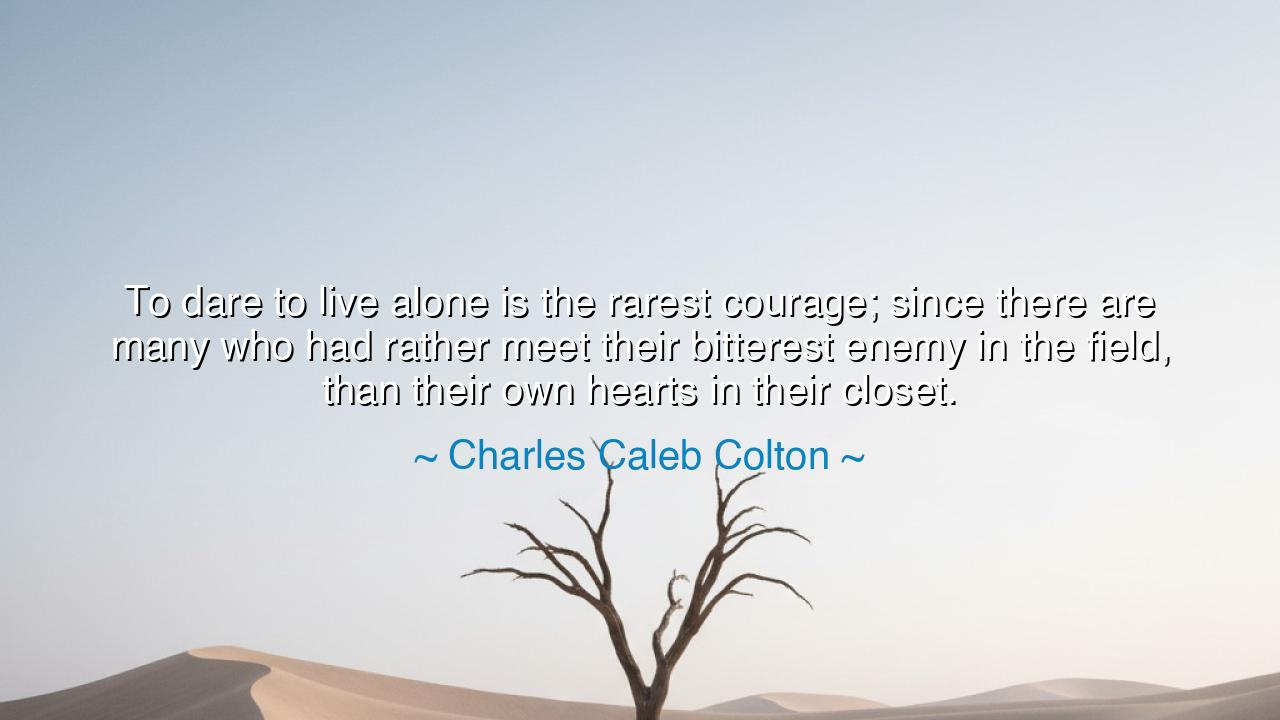
To dare to live alone is the rarest courage; since there are many
To dare to live alone is the rarest courage; since there are many who had rather meet their bitterest enemy in the field, than their own hearts in their closet.






Charles Caleb Colton imparts a profound insight with the words, "To dare to live alone is the rarest courage; since there are many who had rather meet their bitterest enemy in the field, than their own hearts in their closet." In these words, Colton unveils a deep truth about the human condition: that to truly face oneself, to live in solitude, is one of the most difficult and courageous acts. For many, it is far easier to confront external enemies, to engage in battles in the world outside, than to face the internal conflict and truths that lie within. To live alone is to embrace that solitude, to confront the full weight of one’s thoughts, fears, and regrets, something most are unwilling to do. Solitude reveals truths that can be uncomfortable, but it is through this process that true strength and growth are forged.
In the ancient world, the act of self-reflection was held in high regard, yet it was not easy. The Stoics, led by figures like Epictetus and Marcus Aurelius, taught that the true philosopher must learn to be at peace with themselves in solitude. Epictetus famously said, "No man is free who is not master of himself." To master oneself, to understand one's emotions, desires, and weaknesses, requires solitude and the courage to face the darker aspects of one’s nature. Yet, in that solitude lies the potential for true freedom, for only when we understand ourselves can we achieve true peace and self-mastery. The Stoic’s path was one of courageous solitude, where the battle was not against external forces, but the internal forces that kept the soul in turmoil.
Consider the great warrior Achilles, whose fame in battle was unparalleled. Yet, despite his strength on the battlefield, Achilles was often driven by pride, anger, and internal conflict. His rage at Agamemnon led him to retreat from the battle, leaving the Greeks vulnerable. Achilles’ greatest enemy was not the Trojans, but his own emotions and the inability to reconcile his sense of honor with the realities of war. In the end, his path to self-realization came only when he was forced to face the deeper truths of his heart—his pride, his grief over Patroclus, and his desire for revenge. This inner confrontation, which he feared, was the real battle he had to fight. In facing his own heart, Achilles found a sense of peace and a greater understanding of his own humanity, though it came too late to save him from his tragic fate.
The lives of artists and thinkers are often marked by similar struggles with solitude and self-confrontation. Vincent van Gogh, whose brilliant art is celebrated today, lived much of his life in isolation, grappling with the solitude that often accompanies creativity. He was isolated by his own inner demons, his mental health struggles, and his inability to connect with others in meaningful ways. Yet, in his solitude, he produced works of such power and depth that they continue to move us today. Van Gogh’s willingness to live alone, to endure the internal battles of loneliness, despair, and rejection, gave rise to a creative legacy that transcends his own life. He dared to face the darkness within, and in doing so, he achieved a form of immortality.
But there are also those who, like many of us, shy away from this confrontation with the self. The fear of loneliness and the dread of facing one’s own heart often push people toward distractions, toward external validation, and toward relationships that numb the inner turmoil. Many are willing to face the trials of the world—the fight against external enemies, the pursuit of wealth, fame, or success—rather than face the uncomfortable truths that can only be found in solitude. But it is precisely this refusal to confront the self that leads to a shallow life, one that never fully reaches its potential. It is the person who dares to be alone, who seeks solitude not as a punishment but as an opportunity for growth, that achieves the kind of wisdom that can withstand the storms of life.
The lesson here, dear reader, is one of profound self-realization. The bravery of facing one’s own heart—of living alone and confronting the truth within—is the first step toward true strength. It is easier to fight external enemies than to face the battle that rages within. But it is in facing that internal conflict—acknowledging fears, insecurities, and past wounds—that one can find the path to peace, wisdom, and purpose. The courageous warrior does not always fight in battle; sometimes, the greatest victory is over the self.
Therefore, take heed of Colton’s wisdom. Do not fear solitude. Seek moments to be alone, to reflect on your life, and to face the difficult questions that arise in the quiet. In solitude, we find the true strength to grow, to change, and to understand ourselves. Solitude is not a burden but a blessing, a space in which the heart can find its way. Be willing to face your own heart, for in doing so, you will find the courage and clarity to face the world with a strength that no enemy can defeat.






AAdministratorAdministrator
Welcome, honored guests. Please leave a comment, we will respond soon